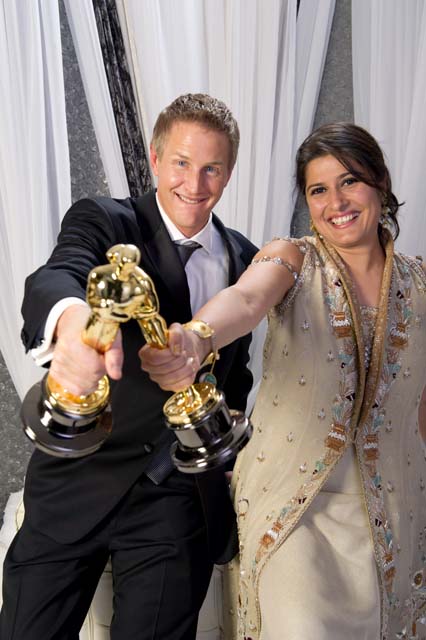
Oscar Win – Sharmeen Obaid Chinoy & Daniel Junge
For people from South Asia, especially Pakistan, it was a big moment when Sharmeen Obaid Chinoy won the Oscar for Best Documentary for ‘Saving Face’.
It was a triumph for the Pakistani filmmaker and her co-director Daniel Junge, a triumph for Pakistan bringing home Oscar gold for the first time – but most of all, it was a triumph for the women who have been victimized with acid attacks – the most incomprehensible mode of revenge by angry men – jilted lovers and disgruntled spouses.
Receiving the iconic gold statuette, Sharmeen Obaid Chinoy said, “Daniel and I want to dedicate this award to all the heroes working on the ground in Pakistan including Dr. Mohammad Jawad who’s here with us today, the plastic surgeon working on rehabilitating all these women; Rukhsana and Zakia who are our main subjects of the film whose resilience and bravery in the face of such adversity is admirable, and to all the women in Pakistan who are working for change, don’t give up on your dreams. This is for you.”
Backstage, they spoke with interviewers, discussing the win. Asked as to what she would like Americans to know about Pakistan that they probably don’t know, Chinoy responded: “That it’s possible that women like myself are born and raised there, emancipated, educated women, who return back to Pakistan to give back to that country. I lived in the United States for ten years. I went to college here and worked here, and I chose to go back because people like myself need to go back to create change in Pakistan. ”
A Photo Gallery of the 84th Academy Awards celebrations – All photographs are Copyright© A.M.P.A.S
Sharmeen Obaid Chinoy, An Interview at Asia Society
What do you think winning the Oscar will mean for Pakistan’s image and stature abroad? And what does the Oscar nomination mean for you personally?
I think that its important for Pakistanis to share their talent and skill with the rest of the world. I am proud to be representing Pakistan on such a prestigious platform and I hope that I am the first of many Pakistanis to do so. In terms of our image abroad, I think it will be interesting for people to see a different side of Pakistan, even if it is just for one night.
You can read the entire interview here
Interview Sharmeen Obaid Chinoy
Saving Face – More than a Film, A Testament to Courage
In Pakistan alone there are 100 acid attacks a year, and this powerful film tells the whole horrific story.
“Saving Face provides insight into the lives of the most oppressed members of Pakistani society. It goes beyond the immediate horrors of acid violence to its prolonged effects. It forces its viewers to empathize with, but also admire the immense strength of the survivors,” says Sharmeen Obaid Chinoy.
” As a woman who has never been subjected to gender discrimination in Pakistan, the awareness that such acts occur and are regarded as the norm in segments of Pakistani society deeply affects me. Yet I believe that stimulating thought about such a sensitive issue is the first step in the direction of alleviating it.”
The documentary takes viewers into the lives of two survivors Zakia, a 39-year old woman who had acid thrown on her by her husband after filing for divorce, and Rukhasana, 23, who was attacked by her husband and in-laws. Dr. Mohammad Jawad is the London-based Pakistani plastic surgeon who transforms the lives of the two victims.
“People often physically cringe when I tell them the subject of ‘Saving Face’,” writes Daniel Junge in his director’s notes. “Indeed, the subject is worthy of it — the ability of one human being to literally deface another. But I’m quick to point out that our challenge as filmmakers, and hopefully what we’ve accomplished, is to go beyond the horror of these crimes and portray the humanity of the survivors and the small steps Pakistanis are taking to tackle this vexing problem. The film must be more than an expose of horrendous crimes — it must be a recipe for addressing the problem and a hope for the future.”
Facts About Acid Violence and How you can help
What is Acid Violence?
Acid violence is the deliberate use of acid to attack another human being. It is estimated that some 80 percent of victims are women and almost 40 percent are under the age of 18. Attackers often target the head and face in order to maim, disfigure and blind. The act rarely kills but causes severe physical, psychological and social scarring, and victims are often left with no legal recourse, limited access to medical or psychological assistance, and without the means to support themselves.
Acid violence is a worldwide phenomenon that is not restricted to a particular race, religion or geographical location. It occurs in many countries in South-East Asia, Sub-Saharan Africa, the West Indies, and the Middle East. Recently attacks have emerged in other regions including attacks in the U.K. and the United States. Acid attacks are most common in Cambodia, Afghanistan, India, Bangladesh and Pakistan. In many countries acid attacks constitute a “hidden” form of violence against women and children that often goes unreported even though the visible signs of the crime are difficult to overlook.
How does it occur?
The availability of acids, such as Nitric or Sulphuric Acid used in manufacturing and processing cotton and rubber, is a leading cause of attacks. Weak rule of law, political corruption and cultural inequalities between genders have contributed to increasing incidents of acid violence in many countries.
What can be done to stop acid violence?
Read more about it
Here







2 Comments
I think it’s an issue in all South Asian countries – it’s just something that most people don’t want to talk about. It takes courage to point out the warts in society and Sharmeen Obaid Chinoy has certainly done that.
Via Facebook
Interesting – I recently read Mohammed Hanif’s book Our lady Of Alice Bhatti, which offers a rare glimpse of Christians in Pakistan but ends in acid attack. India has its fair share of acid attacks. But didn’t realize Pakistan had the same issue. Congratulations to Sharmeen Obaid Chinoy!